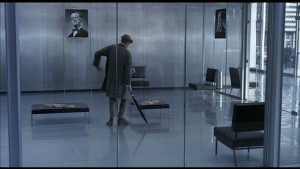From Time Out (London), Sept. 27—Oct. 3, 1974. –- J.R.


‘Amarcord’ (Curzon, Warner West End) is Fellini at this ripest and loudest, which is not to say always at his best. Recreating a fantasy vision of his home town during the fascist period, with generous helpings of soap opera and burlesque, he generally gets his better effects by orchestrating his colorful cast of characters around the town square, on a boat outing, or at a festive local wedding. When he narrows his focus to individual groups, he usually limits himself to corny bathroom and bedroom jokes which produce the desired titters but little else. But despite the ups and downs, it’s still Fellini, which has become an identifiable substance like salami or pepperoni that can be sliced into at any point, yielding pretty much the same general consistency and flavor. There are the expected set pieces (family dinner, fascist rally), the customary cartoon cut-outs (a blind accordionist, a tobacconist with breasts the size of watermelons), and the tearful tones of Nino Rota, as evocative as ever. Fellini’s home town would have liked it. (Jonathan Rosenbaum)

 Read more
Read more
From Film Comment, Winter 1971-72. This was my second Paris Journal for that magazine, and my first extended effort to write about Playtime. -– J.R.

All five of Jacques Tati’s films have musical backgrounds of such surpassing unsubtlety that they are insipid even by Muzak standards; processions of cute kids, dogs, and middle-class nonentities that are not so much mildly parodied (on the surface) as embraced and advertised; the kind of comic ambiance that usually attracts either a Saturday afternoon family crowd or no one at all. Of the four that I have seen, two (MON ONCLE and TRAFIC) repeatedly grate on my nerves, and one (LES VACANCES DE MONSIEUR HULOT), after several viewings, has come to seem like an enduring classic. For the other, PLAYTIME, I would gladly trade the collective works of Fellini, Bergman, and all but the best of Godard.
Four years after its opening in Paris, PLAYTIME remains, at this writing, unseen and virtually unknown in the states. The European reception has generally been so cold that distributors are probably afraid to go near it. To speak even of its existence here is to conjure up a ghost: unquestionably Tati’s most expensive and ambitious film — requiring, according to Télé-Ciné, “ten years of reflection, three years of preparation and shooting,” and filmed in 70 mm and stereophonic sound — it already seems destined to share the fate of extravagant commercial failures of the silent era like INTOLERANCE, GREED, and SUNRISE. Read more
Two movie columns published in Summer ’64, a newspaper published by Columbia University and Teachers College in August 1964, while I was attending summer school there in Manhattan. I recall having seen Hitchcock’s Marnie and Renoir’s Boudu Saved From Drowning that same summer for the same publication, and reviewed at least the former, but apparently either this review never ran or my printed copy of it hasn’t survived -– more likely the former. (I still recall attending the press screening for Boudu, and hearing the huffy and irritable old gentleman seated in front of me storm out angrily before the end; then, once I read Bosley Crowther’s negative review in the Times, I realized who this crank was — and why and how he misconstrued the movie’s conclusion.)
That Man from Rio is being released this spring in an attractive, restored 2-disc Blu-Ray package by the Cohen Film Collection, along with de Broca’s follow-up feature. Up to His Ears (Les Tribulations d’un Chinois en Chine, 1965). I’m still hoping for an eventual release of the long-unavailable Five Day Lover (1961), which I recall as my favorite de Broca feature. [P.S. this turned up later in a De Broca box set.] Read more





